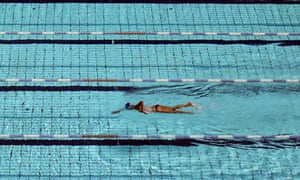Athletes in individual sports are more prone to depression than those in team games, according to German research to be presented at a conference in Cardiff.
The research by the Technical University of Munich confirms not just the loneliness of the long distance runner but a range of other depressive symptoms among solo sportsmen and women more generally.
Prof Jürgen Beckmann, the university’s chair of sports psychology who will be presenting the research, said: “Individual athletes attribute failure more to themselves than team sports athletes. They take the blame more than team players. On a team there is a diffusion of responsibility, as social physiologists would say, compared with the performance of an individual athlete.”
One of the studies compared 128 young German footballers and hockey players with 71 junior athletes in a range of individual sports including swimming, speed skating and badminton.
They were assessed on a depression scale that measures symptoms such as guilt, sadness and suicidal feelings. It found that individual athletes showed significantly more signs of such symptoms than athletes in team sports.
The finding was replicated in a study of 162 senior elite athletes including many in various German national teams. Individual athletes including triathletes, golfers and cyclists were found to have higher symptoms of depression than team players in games that included volleyball, rugby and football.
The research, which is to be presented at the British Psychological Society annual sport and exercise conference in Cardiff on Monday, found that the individual athletes tend to blame themselves for sporting failure.
One of the papers to be presented suggests that individual athletes take both sporting success and failure more personally than team players. “The internal attribution could lead to stronger experiences of emotions such as pride (positive events) and guilt or shame (negative events) in athletes in individual sports,” one of the papers says.
The researchers also expected to find more signs of perfectionism among individual athletes but were surprised to discover that team players were more prone to perfectionism.
A separate long-term study found that perfectionism and chronic stress often led to burnout but not depression. Depression was found to be linked with a lack of time to recover from stress and injury.

The research also found that depressive symptoms were particularly prevalent among young athletes. Beckmann said: “The real problem is with young athletes. Those who receive social support from parents and peers experience much less stress than those who don’t. That’s especially important during adolescence.
“We found that up to 20% of young athletes do have a problem with higher depression scores. In the general population its range is between 9% and 12%.
“We are not diagnosing them as being depressive, but on the depression scales they have quite a score.”
He said subsequent studies have suggested that the level could be even higher among solo athletes only. “We have very high prevalence rates in swimming, for example,” Beckmann said.
He called for more support to be given to athletes to help them recognise signs of depression and to suggest ways of tackling it.
He said: “In Germany, we have developed a burnout and screening instrument for junior athletes and a website to give them advice on coping with stress and other psychological problems they may experience.”
The mental health charity Mind said the research underlined pressures facing athletes. Hayley Jarvis, Mind’s community programmes manager for sport, said: “Following the increasing number of ex-sportspeople who have spoken out about struggles with their own mental health and some high profile suicides, Mind commissioned research to explore how sports’ governing bodies and players’ organisations currently deal with mental health, and identify best practice which can be shared with other sports.
“To help create an environment where all sports professionals can fulfil their potential, we need to see managers, coaches, clubs, governing bodies and players’ unions all support athletes to manage their mental wellbeing.”
Andy Baddeley’s story

Andy Baddeley, a two-time Olympian and Britain’s former No 1 1,500m runner, has blogged about his experiences of depression on the Mind website. Speaking to the Guardian, he said:
The hardest thing about running is that you are on own before a race. When things are great that’s what’s good about it. I’m not dependent on 10 other guys being on the top of their game in order for me to be successful. But there is also nothing to fall back on. The nature of athletics is that one guy gets to win each race, and so there’s 11 or more in my event who don’t. And its that unpredictability that’s the hard bit.
It got to a point with my coach when I couldn’t express how low I was. There are not many people I get to talk to about these things. I’m not surrounded by a team. I don’t have to turn up to a training ground.
I have often felt that I would be better suited to a team sport. What I enjoy most is group training, but the nature of distance running is that that doesn’t happen every day.
You’re the only one who can train hard. It is a lonely decision each day, especially when it’s cold and raining. If I plan to meet someone, I find that’s powerful in terms of motivation. And it’s the days when I am not meeting someone that it takes me a lot longer than it should to get myself out of the door. Talking to someone is what has helped me.
My mental health has been best when I’ve been meeting coaches and other team members.
Having a mental heath struggle doesn’t mean you are not mentally strong for a race. These things are separate. You can still run through the pain barrier but still have bad days – they are not mutually exclusive.
People think admitting mental health problems makes them seem weak or susceptible to being beaten. But after I wrote about my experiences I felt stronger.
I was lucky enough to see a sports psychologist when I was on lottery funding. When I was injured I saw someone privately and that helped. I deliberately chose a non-sports psychologist because I wanted more of an idea of what was normal, rather than what’s normal in elite sport.”
In the UK, the Samaritans can be contacted on 116 123. In the US, the National Suicide Prevention Hotline is 1-800-273-8255. In Australia, the crisis support service Lifeline is on 13 11 14. Hotlines in other countries can be found here.
Individual athletes more prone to depression, researchers find
Hiç yorum yok:
Yorum Gönder